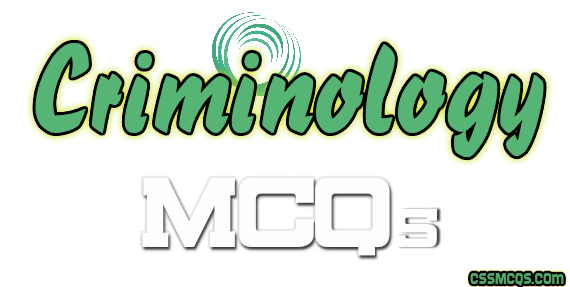Criminology MCQs by CSSMCQs

Criminology MCQs
Here, you may find CSS Criminology MCQs. If you want to prepare MCQs for Criminology of CSS Exam then you are in the right place. You can Criminology Multiple Choice Questions here because CSSMCQs platform is here to serve you while preparing your CSS Exam MCQs portion section-A. Please practice this CSS criminological MCQ on a daily basis
Introduction to Criminology MCQs for CSS
In the role of __________, the criminologist analyzes many kinds of programs for dealing with criminal behaviour and recommends changes and their direction.
A. Evaluator
B. Scientific
C. Objectivity
D. Interactionist
Answer: a
The criminological approach to an understanding of crime can be distinguished from other approaches in that criminology attempts to use the ______ method in its investigations.
A. Evaluator
B. Scientific
C. Objectivity
D. Interactionist
Answer: b
__________ refers to the ability and willingness to study the subject matter of a given field without prejudice or bias.
A. Evaluator
B. Scientific
C. Objectivity
D. Interactionist
Answer: c
The __________ perspective focuses on human behavior and social life from the standpoint of the individuals involved in day-to-day interaction.
A. Evaluator
B. Scientific
C. Objectivity
D. Interactionist
Answer: d
Beccaria was in favor of the death penalty
A. True
B. False
Answer: b
The Classical School demanded recognition of rationality and the ability to exercise informed choice in human social life.
A. True
B. False
Answer: a
Many contemporary programs designed to prevent crime have their philosophical roots in the classical axioms of deterrence and punishment.
A. True
B. False
Answer: a
Atavism implies that certain people learn to be criminal.
A. True
B. False
Answer: b
For criminologists, __________ behaviour is behaviour that does not conform to the social norms of society.
A. Deviant
B. Conformity
C. Relative
D. Civil or tort
Answer: a
__________ to the norms and laws of a community results from a system of internal controls developed within a person during the process of socialization.
A. Conformity
B. Laws
C. Relative
D. Civil or tort
Answer: a
__________ are formal norms.
A. Conformity
B. Laws
C. Relative
D. Civil or tort
Answer: b
Crime is __________ to the factors of time and place.
A. Conformity
B. Laws
C. Relative
D. Civil or tort
Answer: c
__________ law deals with noncriminal offenses.
A. Conformity
B. Laws
C. Relative
D. Civil or tort
Answer: d
The chance of being a victim of a crime is greater than that of being hurt in a car accident.
A. False
B. True
Answer: b
Any proposed social or political policy or treatment program for dealing with crime is based on some type of theory.
A. False
B. True
Answer: b
A criminologist’s research design precisely defines the kinds of data to be collected but not the sources to be used in gathering the data.
A. True
B. False
Answer: b
Unlike the conflict perspective, which views society as having an overall unity that is impaired by conflict, the consensus approach has as its starting point the diversity, heterogeneity, and lack of uniformity in contemporary society.
A. True
B. False
Answer: b
Criminal behavior is behavior in violation of the criminal laws of society.
A. True
B. False
Answer: a
The state represents the final authority within society.
A. True
B. False
Answer: a
Violation of laws termed misdemeanors involve substantial penalties, such as heavy fines and/or imprisonment.
A. True
B. False
Answer: b
Laws that prohibit such behaviors as murder and rape are referred to as mala prohibita.
A. True
B. False
Answer: b
Some acts end up in both civil and criminal courts.
A. True
B. False
Answer: a
For Durkheim, there is no society that is not confronted with the problem of criminality.
A. True
B. False
Answer: a
Which of the following phrases does not define criminology?
A. it is a scientific study of making laws and the breaking of laws
B. it is a subjective view of why crime occurs
C. it is society’s reaction to the breaking of law
D. it adopts methods of study from all the social and behavioral sciences
Answer: b
Which of the following is a misconception about the study of crime?
A. criminologists utilize a broad scientific perspective
B. criminology studies street crime, corporate, and global crimes
C. crime is a local matter
D. criminology includes the study of crime, penal codes, and deviance
Answer: c
Criminologists are primarily interested in the study of terrorism because:
A. it is at the hub of many other forms of criminality.
B. large numbers of people die.
C. it is a foreign-based crime.
D. most people do not understand its motivation.
Answer: a
What crime does the Taliban use to fund its terrorist activities?
A. money laundering
B. computer crime
C. destruction of cultural property
D. illicit drug trafficking
Answer: d
Money laundering is described as:
A. only required for drug money.
B. an activity aimed at making illegally obtained finds appear legitimate.
C. required for both illegally and legally obtained funds.
D. None of the above.
Answer: b
Which type of enterprise has terrorist operatives used to infiltrate legal business?
A. import-export firms
B. construction companies
C. new media outlets
D. restaurants
Answer: a